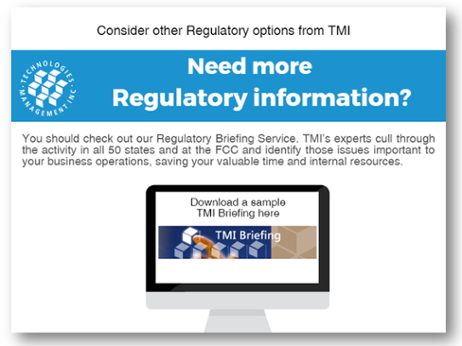 Today: FCC December Open Meeting - FCC Reclassifies BIAS as Information Service
Today: FCC December Open Meeting - FCC Reclassifies BIAS as Information Service
FCC Reclassifies BIAS as Information Service
As expected, the FCC voted at its December 14, 2017, Open Meeting to reclassify Broadband Internet access service (BIAS) as an information service. Among other things the order also:
- Reinstates the classification of mobile broadband Internet access service as a private mobile service.
- Requires that ISPs disclose information about their practices to consumers, entrepreneurs, and the FCC, including any blocking, throttling, paid prioritization, or affiliated prioritization.
- Eliminates the no blocking, no throttling, and no paid prioritization rules, finding that transparency, combined with market forces as well as antitrust and consumer protection laws, achieve benefits comparable to those of the three rules.
- Eliminates the Internet Conduct Standard.
- Finds that the regulatory uncertainty created by utility-style Title II regulation has reduced Internet service provider (ISP) investment in networks, as well as hampered innovation, particularly among small ISPs serving rural consumers.
- Restores broadband consumer protection authority to the Federal Trade Commission (FTC)
 In response to the FCC’s action, House Energy and Commerce Committee Chairman Greg Walden (R-OR) and Communications and Technology Subcommittee Chairman Marsha Blackburn (R-TN) issued a statement saying: “The FCC’s vote today will preserve the open and dynamic Internet the American people have known since the early 1990s. The light-touch Title I rules, under which the Internet flourished for decades, will help more Americans than ever before access the web, video streaming, telemedicine, and the innovations of the future made possible by increased investment in broadband. Now, the table is set for Congress to provide clear, permanent rules through a bipartisan legislative solution. We hope that all stakeholders, and our Democratic colleagues, will finally engage in serious negotiations soon.”
In response to the FCC’s action, House Energy and Commerce Committee Chairman Greg Walden (R-OR) and Communications and Technology Subcommittee Chairman Marsha Blackburn (R-TN) issued a statement saying: “The FCC’s vote today will preserve the open and dynamic Internet the American people have known since the early 1990s. The light-touch Title I rules, under which the Internet flourished for decades, will help more Americans than ever before access the web, video streaming, telemedicine, and the innovations of the future made possible by increased investment in broadband. Now, the table is set for Congress to provide clear, permanent rules through a bipartisan legislative solution. We hope that all stakeholders, and our Democratic colleagues, will finally engage in serious negotiations soon.”
Also in response, Acting FTC Chairman Maureen K. Ohlhausen issued a statement saying: “The FCC’s action today restored the FTC’s ability to protect consumers and competition throughout the Internet ecosystem. The FTC is ready to resume its role as the cop on the broadband beat, where it has vigorously protected the privacy and security of consumer data and challenged broadband providers who failed to live up to their promises to consumers. In addition, the FCC’s new transparency rules provide additional tools to help ensure that consumers get what they expect from their broadband providers, who will be required to disclose their traffic management practices. The Memorandum of Understanding establishes a framework for FTC-FCC cooperation. Together we will move ahead to protect consumers and help ensure they enjoy the many benefits of online innovation.”
Additionally, the Chairman and Ranking Member of the Senate Commerce Committee reacted to the FCC’s action, with both calling for legislation to address the issue of net neutrality. Chairman John Thune (R-SD) issued a statement saying: “Now that the FCC has acted to reverse an ill-conceived regulatory scheme, Congress must take the lead in setting a clear path forward through bipartisan legislation to avoid the risk of regulatory back and forth. As I did before the Obama Administration first put its rules into place in 2015, I favor Congress enacting net neutrality protections and establishing sensible limits on the power of regulators. I call on Democrats and Republicans who want to preserve a free and open internet to work together on permanent consumer protections.”
Ranking Member Bill Nelson (D-FL) issued a statement saying: “Today, in a strictly partisan vote, FCC Republicans turned their backs on consumers by voting to give internet providers the ability to decide what websites their customers see, how fast they see them and how much they are going to have to pay for access. Congress needs to fix the mess the FCC has now created with a lasting solution that will fully protect consumers and preserve the FCC’s authority. Securing these protections will be difficult and won’t happen quickly given the current political climate in Congress. But, for the sake of consumers, we have to continue to try.”
Last but not least, the FCC and FTC released a final, signed version of their Memorandum Of Understanding that is intended to govern how they will coordinate their consumer protection efforts relating to broadband Internet access service. See the Regulatory Mix dated 12/12/17.
TMI Briefing Service subscribers, watch for a Briefing once the text of the FCC’s order is released.
____________________________
The Regulatory Mix, TMI’s daily blog of telecom related regulatory activities, is a snapshot of PUC, FCC, legislative, and occasionally court issues that our regulatory monitoring team uncovers each day. Depending on their significance, some items may be the subject of a TMI Briefing.




